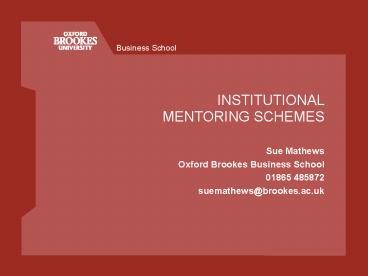INSTITUTIONAL MENTORING SCHEMES PowerPoint PPT Presentation
1 / 14
Title: INSTITUTIONAL MENTORING SCHEMES
1
INSTITUTIONAL MENTORING SCHEMES
- Sue Mathews
- Oxford Brookes Business School
- 01865 485872
- suemathews_at_brookes.ac.uk
2
OBJECTIVES FOR THIS SESSION
- Some understanding about the thinking behind an
institutional mentoring scheme - Appreciation of some of the practical issues in
setting up an institutional mentoring scheme - Opportunity to reflect on the implementation of
a mentoring scheme - Ideas for improving your own institutional
mentoring scheme
3
THE MENTORING RANGE
- 1. A powerful form of management learning in
which a more experienced individual passes on
know-how to someone less experienced - Clutterbuck Associates, 1996
- 2. Off-line help by one person to another in
making significant transitions in knowledge, work
or thinking - Megginson and Clutterbuck, 1995
- 3. Support, assistance, advocacy or guidance
given by one person to another in order to
achieve an objective or several objectives over a
period of time - Sova
- 4. The support of one individual by another
within a personal relationship developed though
regular contact over a period of time - Pan, London Standard
4
MENTORING - A CONTINUUM
- Directive Telling Discussing
Reflective - 1. 2. 3. 4.
5
WHAT IS A MENTOR?
- Off-line help by one person to another in making
significant transitions in knowledge, work or
thinking - Megginson and Clutterbuck (1995)
6
TYPES OF LEARNING
- Mental Maps Behaviours
Outcomes - SINGLE LOOP
- Adjusting to
- DOUBLE LOOP action to achieve
- (mentoring) the desired outcome
- Transforming mental
- maps to generate new meanings
- and actions Argyris and Schon, 1997
7
SOME KEY ORGANISATIONAL QUESTIONS
- Why does the organisation want to offer a
mentoring scheme? - How do we relate the above to organisational
objectives - Will if offer vfm?
- How will the culture of the organisation support
the mentor-learner relationship? - Do the mentors have an understanding and
perspective of the organisation? - Do the mentors have credibility within the
organisation? - Do the mentors have the appropriate skills?
- Who will administer the scheme?
- How will we evaluate the scheme?
- Will all staff support the scheme?
8
SOME KEY QUESTIONS FOR INDIVIDUALS
- What are the organisations objectives for the
learner? - What are the individuals own learning
objectives? - How do the individuals objectives link to
organisations? - Are the learners objectives s.M.A.R.T.?
- How is the benefits to the learner to be
evaluated? - How will I select a mentor?
- Who controls the scheme?
9
HOW WE SET UP OUR SCHEME
- Focus group to establish needs, topics ,ideas on
key concerns and mentoring topics. The focus
groups also doubled as a promotional tool. - 2. Used data from the focus groups to answer some
of the organisational and individual questions,
presented to the SMT to win their approval (and a
budget). - Consulted with IT people about an electronic
mentor/learner process which could be accessed
off-site, with the mentees selecting their
mentors from a list. - Started recruiting mentors and training them (2
days). - Set up a dedicated Mentoring Scheme Website site
so staff could sign up for a mentors' course or
learners briefing this gave links to the
Personal Information Pages where the matching
process was lodged. - Saturation marketing of scheme leaflets, talks,
briefings for all managers, signed up senior
managers as mentors. - Big launch of scheme by the Pro Vice- Chancellor.
10
SOME PRACTICAL ISSUES
- Time for meetings
- Places for meetings
- Maintaining confidentiality
- Skills level of mentors
- Matching mentors and learners
- Support from line manager
- Evaluating the scheme
11
BROOKES MENTORING PRINCIPLES
- Be available at a time and place thats
convenient for staff - Be staff-centred and controlled it empowers you
to direct your own development - Support career enhancement - you can talk about
your careers with knowledgeable people who are
able to support and encourage you - Provide additional support for people on training
courses or taking qualifications - Offer opportunities for you to explore career
choices - Create development opportunities it is a useful
way to network - Provide a confidential opportunity to talk over
troubling issues with someone - Support diversity, by offering a development path
that is flexible for everyone - Benefit the mentor as well as the mentee. In
becoming a mentor you will receive appropriate
people skills training, which you can use with
your own colleagues or team - Be entirely confidential
- 1.
12
BENEFITS OF MENTORING
- The mentor gains
- An opportunity to develop themselves and support
own career - Increased motivation and job satisfaction
- An opportunity to assess own future potential
- A range of essential career skills in
communication, relationship building as well as
mentoring
13
THE BENEFITS OF MENTORING
- The Learner gains
- Encouragement in self development
- An increase in self-awareness and self-confidence
- Career development supporting career progression
- An opportunity to explore ideas, concerns,
ambitions
14
-
- QUESTIONS?

